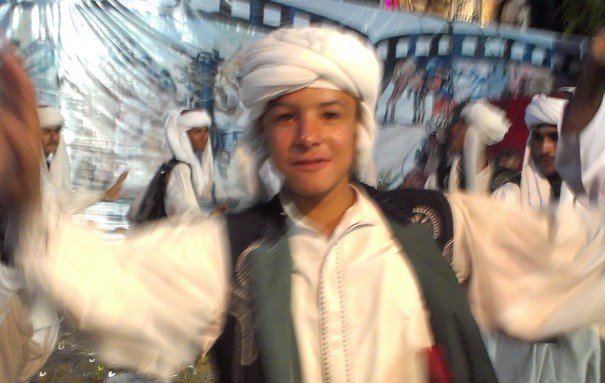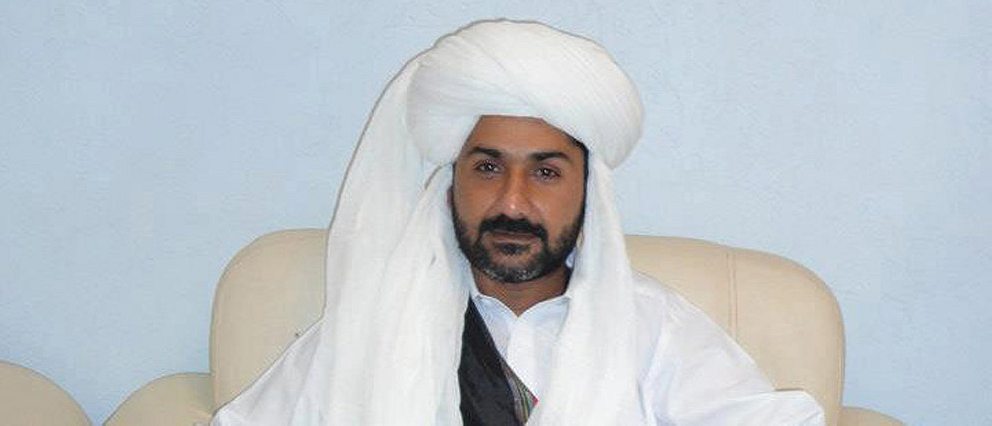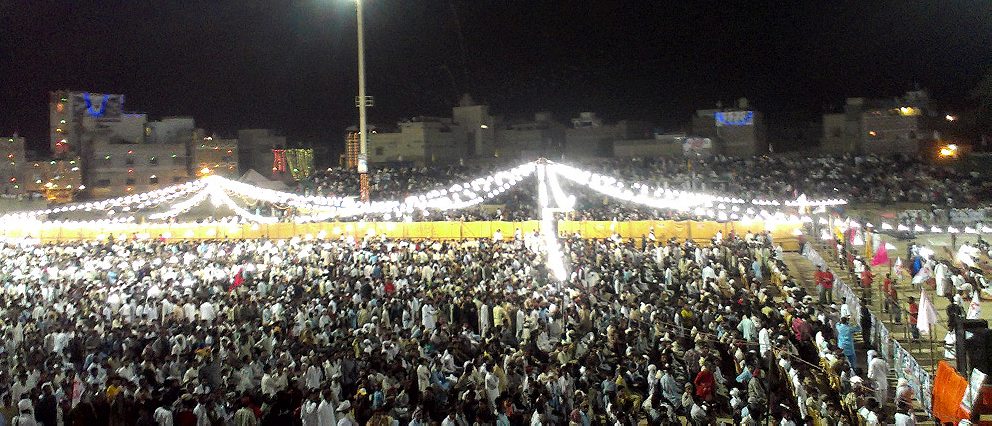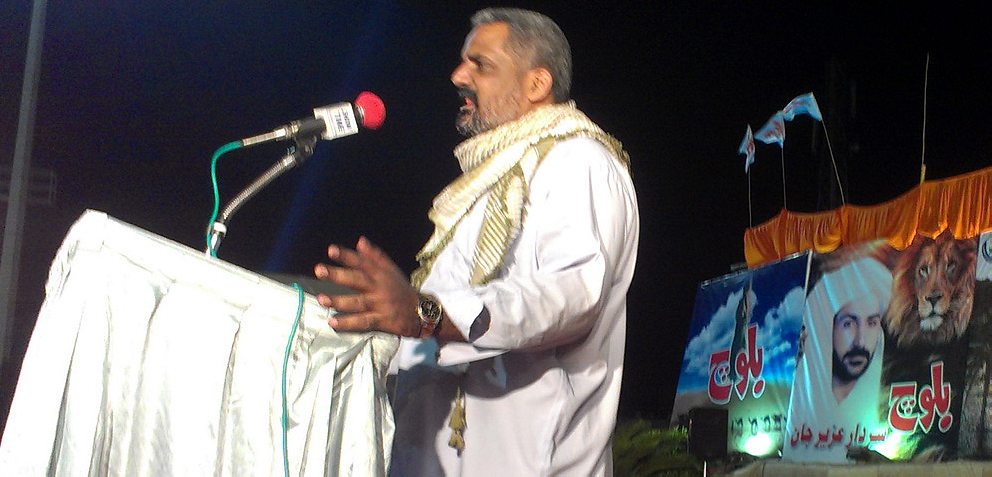
Gangster’s Ball

At the block party (for 250,000 people) thrown by one of the most notorious crime syndicates in Karachi.
I am not a criminal, extortionist or terrorist,” Uzair Jan Baloch declares. The police files on him tell a different story: as the alleged head of a vast criminal enterprise, Uzair is implicated in attacking cops, running an extortion racket, damaging property and torturing or even murdering rivals. But on this Saturday night in early March, the heads of the neighborhood police stations are partying with Uzair, along with a smattering of prominent politicians and up to 250,000 residents of Lyari, a district near the port in Karachi that has gained a reputation, unfair or not, for organized crime. Tonight, however, Lyari is not presenting itself as a gangster’s paradise. It is a stronghold of the Baloch ethnic group, and everyone has gathered here for the mashup of fireworks, camels and free food that is the three-year-old Baloch Culture Day festival.

The event isn’t organized by ordinary Baloch people, however. Rather, it’s put on by Lyari’s most prominent criminal syndicate, the Peoples Amn Committee (People’s Peace Committee).Uzair, who like many Baloch has taken the ethnic group’s name as his own last name, presides as host for the party that starts at 7 pm and continues till the sun rises.
The event packs into one of Lyari’s biggest football stadiums and is officially credited to the ‘Lyari Resource Centre’, the Amn Committee’s cultural and charity wing. Even though the Baloch, who originally hail from the sprawling Balochistan province that borders Iran and Afghanistan, have lived in Karachi for generations, their sense of identity has remained strong. So for the Baloch Culture Day, the entire district gets into party mode: there are children dressed in intricately beaded traditional Baloch garb, a man perched atop a camel, and politicians being outfitted with turbans.

At the gate for women, a fight breaks out, and excitedly chattering women—their make-up, jewelry and clothes glimmering from a distance—squeeze past a burqa-clad woman pummeling a child and another woman. Gun-toting young men are in charge of security, armed with walkie-talkies to update the crew about arrivals and the movement of cars. The police posted officers around the entire neighborhood, but civilian Baloch men—and some wizened old women—were really in charge of policing.
In its third year, the syndicate’s party is more over-the-top than ever: musicians, a bedecked camel and horses, a confetti machine, and a fireworks display that cost over $2,000. Lyari Resource Centre members claim the event cost anywhere from $300,000 to $800,000. Some of those who shoulder the costs are ‘donors’ who have been forced into contributing resources, according to sources close to the festival. Volunteers walk around the stands, offering guests free food: tea in paper cups and boxes of biscuits and burgers. In the parking lot, someone has tossed away an empty carton of the Pakistani brewed Murree Beer and vendors outside do a brisk trade of selling plates of spiced potatoes.
This kind of co-opting of Baloch culture by the crime syndicate is a fairly recent innovation. The group always focused on its ethnic identity, long claiming they were only stereotyped as violent criminals because of who they were, not what they did. But in its brief lifespan, the Baloch Culture Day has gained an added political element, asserting the syndicate as the only legitimate political voice of the Baloch people. In 2012, the syndicate was defiant at the party after the late Benazir Bhutto’s Pakistan Peoples Party publicly disassociated itself from the syndicate after decades of patronage and support (the PPP had previously leaned on the Peoples Amn Committee for votes and, the Amn Committee alleges, a cut of the profits from the smuggling trade). This year, it is celebrating its public kiss-and-make-up session with the PPP through a song composed for the occasion declaring how the spirit of the Bhuttos was well and alive, as is Uzair’s leadership.
Lyari is one of Karachi’s oldest districts. It was inhabited by the descendants of African slaves far before the city was even called Karachi. In the modern era of the city, Lyari’s proximity to the ports made it a waystation for illegal weapons and drugs. Small time dealers and gangs proliferated since Pakistan’s independence, often patronized by influential political families that rely on votes and a share of the profits from smuggling.
One of these families belonged to Rehman Dakait, a charismatic gang leader turned savior for the impoverished area, who built schools, started handing out cash to the poor and renamed his group the Peoples Amn Committee.
But this battle for leadership of Lyari wasn’t easy. Until he was shot dead by the police in 2009, Rehman Dakait and his gang had fought with rival groups—and an ineffectual police force—for the better part of the decade. Bolstered by his support from the Pakistan Peoples Party, Rehman saw the Amn Committee as a way to legitimize his power base. And even though Lyari has become ethnically divided, it is still controlled by the Baloch-led committee. Not that the syndicate’s power or coziness with politicians has helped the district much: it remains underdeveloped, in large part because politicians have only ever needed the support of the syndicate, not of voters who would benefit from more services.

Under pressure from opposition parties, the PPP government under Pakistan’s president Asif Ali Zardari banned the Amn Committee in 2011. And so, according to Uzair, the group no longer exists. But if you believe the syndicate’s critics, court dockets and police charge sheets, the syndicate is still responsible for everything from killing opponents in rival gangs and political parties to extorting money from traders. And it still has a hold on the popular imagination in Lyari, where Rehman is still considered a martyr four years after his death, with posters of him everywhere in the district. “So handsome, such swagger,” recalls one resident. “Uzair doesn’t have that.”
It’s true: Uzair has little charisma and looks ill at ease when making speeches. But he’s mastered the art of the sound byte; perhaps in part to the dozens of interviews he has given to foreign correspondents that flock to him, at least one of whom could only venture into Lyari in a bullet proof car.
Uzair’s second-in-command Noor Mohammad, whose nom de guerre is Baba Laadla (The Favored Man) and who reportedly handles the syndicate’s street fighters, is short and unassuming. He does not talk to reporters, and isn’t on stage or mingling with the politicians. A colleague and I had asked which person was Baba Laadla, and were a little surprised when we were brought to him: it was the same man we had seen and even met at other events, but we never knew that he was Baba Laadla. He provides short, clipped answers to our questions about the event, all the while typing away on a cheap Nokia cell phone. His basic explanation for what he’s doing at the event is “handling security.”
Uzair may lack charm, but he has what Rehman never did: a shot at political legitimacy. His Facebook community page (Tagline: “The New Lyari Hero”), with 1,747 likes, is filed under Elections and includes polls about whether he should run for office (resounding verdict: YES). At the Baloch Culture Day festivities, he surrounds himself with high profile political guests, as TV crews eagerly record his diatribes against the Muttahida Qaumi Movement, a critic of the syndicate whose own members routinely face off against Baloch’s men. The Muttahida Qaumi Movement is one of Karachi’s dominant political parties, but it has a sordid history of battling rival groups and the state and is still allegedly implicated in crime itself. Uzair’s criticism of them resonates with many in Karachi, especially in his districts.
When I ask Uzair later how he has measured up to Rehman’s legacy, he dismisses the question, saying, “that was the past… the story has changed now.” Despite the portraits of Rehman that are strung up around the event— this is clearly a very well-attended changing of the guard ceremony.
Is Baloch Culture Day meant to whitewash the Peoples Amn Committee’s alleged crimes? “Which ethnic group does not have criminals in its midst?” counters Zafar Baloch, Uzair’s deputy for political affairs, as he rests his arm on the cane he has been using since he survived an assassination attempt in 2010.
“We have been branded a group of barbaric, bloodthirsty predators,” Zafar says. “We are an ancestral group; our city was built by Lyari’s fishermen and laborers. This event is to showcase our culture.”
“If we were criminals, would elected officials be here?” Uzair asks.
All of this celebration comes despite the fact that Balochistan, whose borders starts around 30 km from Lyari, is currently in the grips of ongoing military campaigns, terror attacks and unexplained disappearances.
But if a lavish celebration during such sorrowful times is in poor taste, Lyari’s Baloch residents don’t seem to mind. No one has forced them to come celebrate. And it’s not just the free food that draws them; it’s the opportunity to show their pride in their beleaguered district, to sing anthems of the Baloch people. And for many, the Peoples Amn Committee represents the only hope for proper political representation and development funding. It is certainly the only group willing to defy the government and political parties that believe Lyari needs to be “cleaned out” of criminals (that’s the belligerent phrasing of government officials like PPP legislator Nabeel Gabol). When Uzair haltingly promises that Lyari will one day lead the way for peace in Karachi, the gathered crowd applauds. Forget crime or punishment. Lyari’s Baloch people have been let down by political parties far too often. Uzair is their only bet.